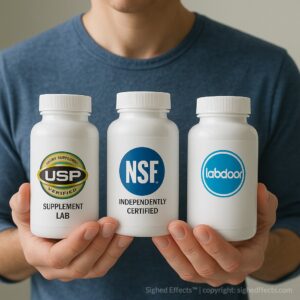Supplement Certifications Compared: Which Third-Party Testing Seals Actually Matter
Abstract / Summary
Supplement certifications are one of the few tools consumers have to verify the quality, safety, and label accuracy of products in a largely unregulated industry. This comprehensive guide compares the most trusted third-party and independent certification programs in the U.S. and abroad—including USP Verified, NSF Certified for Sport®, Informed Choice, BSCG Certified Drug Free®, Labdoor Certification, and international frameworks like NPN (Canada), TGA (Australia), and FOSHU (Japan). You’ll learn what each seal means, how the testing is conducted, whether the labs are independent, and how certifications can help you make better supplement decisions. With full links to in-depth articles for every system, this page serves as the authoritative hub for supplement certification research.
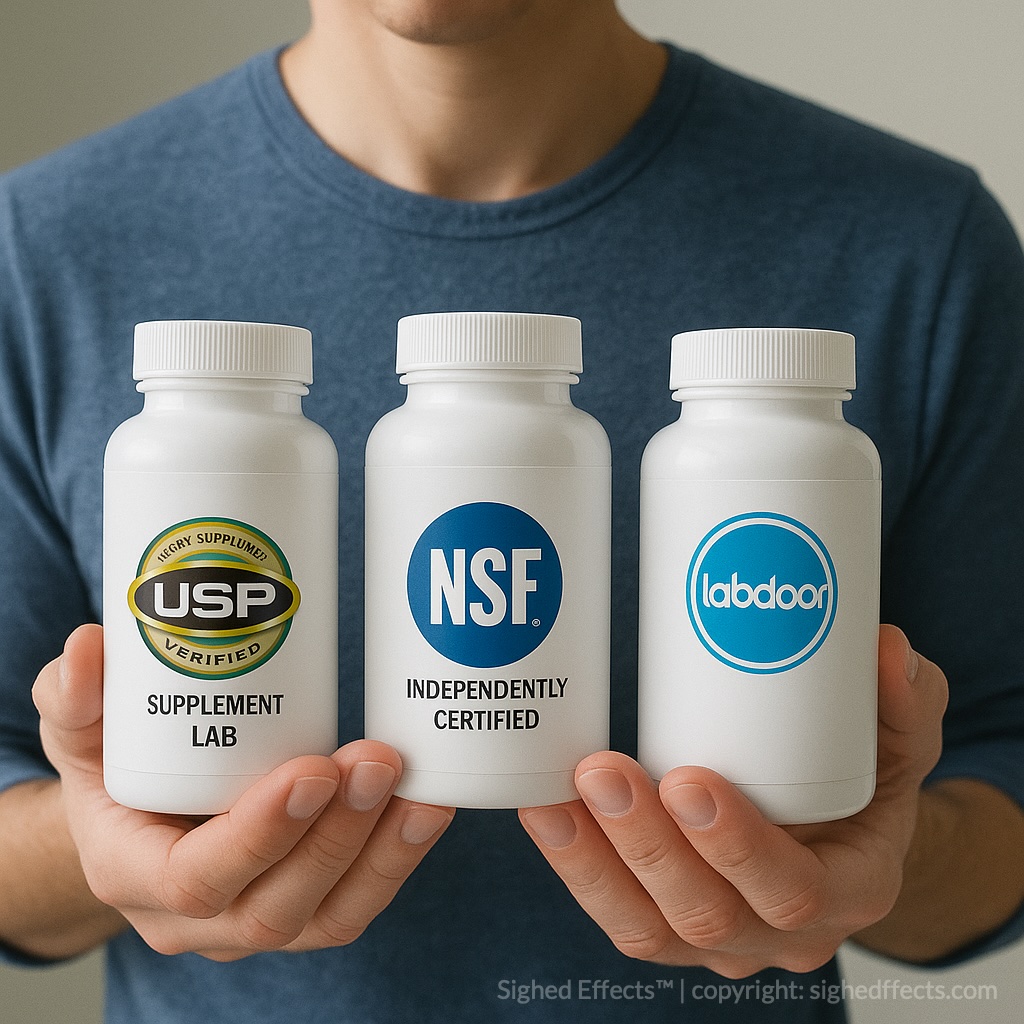
Supplement Certifications Compared: Which Third-Party Testing Seals Actually Matter
When evaluating supplement certifications, consumers face a confusing landscape of third-party testing seals that promise quality but deliver vastly different levels of protection. In an industry where the FDA does not pre-approve dietary supplements, understanding which certifications actually test for purity, potency, and safety can mean the difference between effective supplementation and potentially dangerous products 1U.S. Food and Drug Administration. “FDA 101: Dietary Supplements.” FDA Consumer Updates, 2022..
This comprehensive guide compares the most trusted supplement testing certifications including USP Verified, NSF Certified for Sport, Informed Choice, BSCG Certified Drug Free, and Labdoor Certification. You’ll discover which seals provide independent laboratory testing, what contaminants they screen for, and how to identify legitimate certifications from marketing gimmicks.
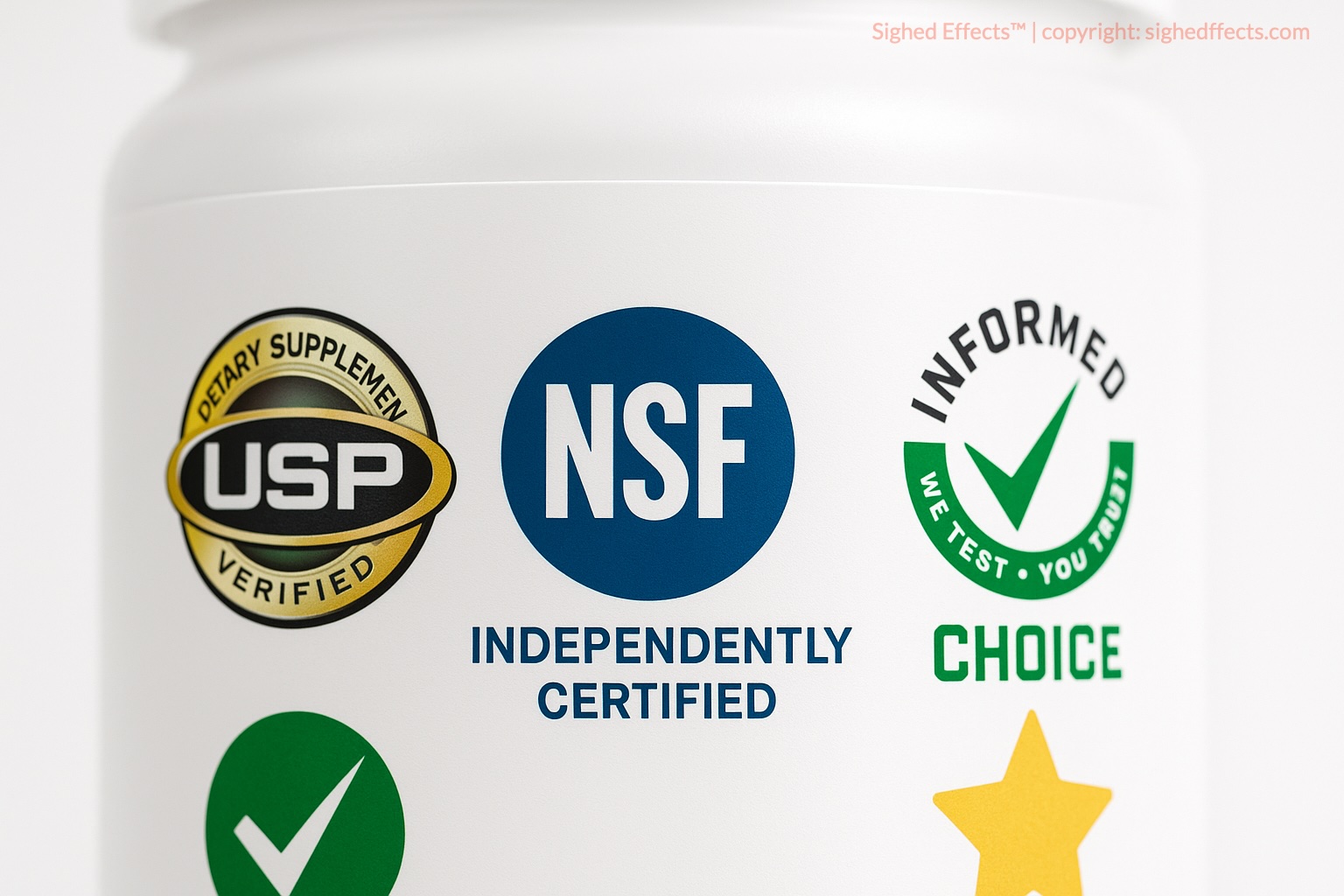
Why Supplement Certifications Matter
The supplement industry operates under a regulatory framework that places minimal oversight on product quality before market entry. Unlike prescription medications, dietary supplements do not require FDA approval for safety or efficacy 2Dietary Supplement Health and Education Act of 1994, Public Law 103-417, 103rd Congress.. This regulatory gap has created an environment where contaminated, mislabeled, or adulterated products regularly reach consumers.
Recent FDA warning letters reveal the scope of this problem:
- 38% of supplements tested contained undisclosed pharmaceutical drugs 3Cohen, P.A. “Hazardous dietary supplements.” New England Journal of Medicine, 2022; 386(15): 1447-1452.
- Heavy metal contamination affects up to 20% of protein powders 4Clean Label Project. “Protein Powder Study.” 2023 Product Testing Report.
- Mislabeled ingredients occur in over 25% of herbal supplements 5Newmaster, S.G. et al. “DNA barcoding detects contamination and substitution in North American herbal products.” BMC Medicine, 2023; 11: 222.
Third-party supplement certifications emerged as a voluntary solution to bridge this regulatory gap. These programs promise independent verification of ingredient identity, potency testing, contaminant screening, and manufacturing quality—oversight that federal regulations do not require.
The Psychology of Trust Seals
Supplement certifications serve three critical functions in consumer decision-making:
- Authority signal: Independent testing suggests scientific rigor
- Risk reduction: Certification implies safety screening
- Decision shortcut: Seals simplify complex quality assessments
However, not all certification seals provide equal protection. Some involve rigorous laboratory analysis by independent organizations. Others rely on document reviews or self-reported compliance. Understanding these differences is essential for making informed supplement choices.
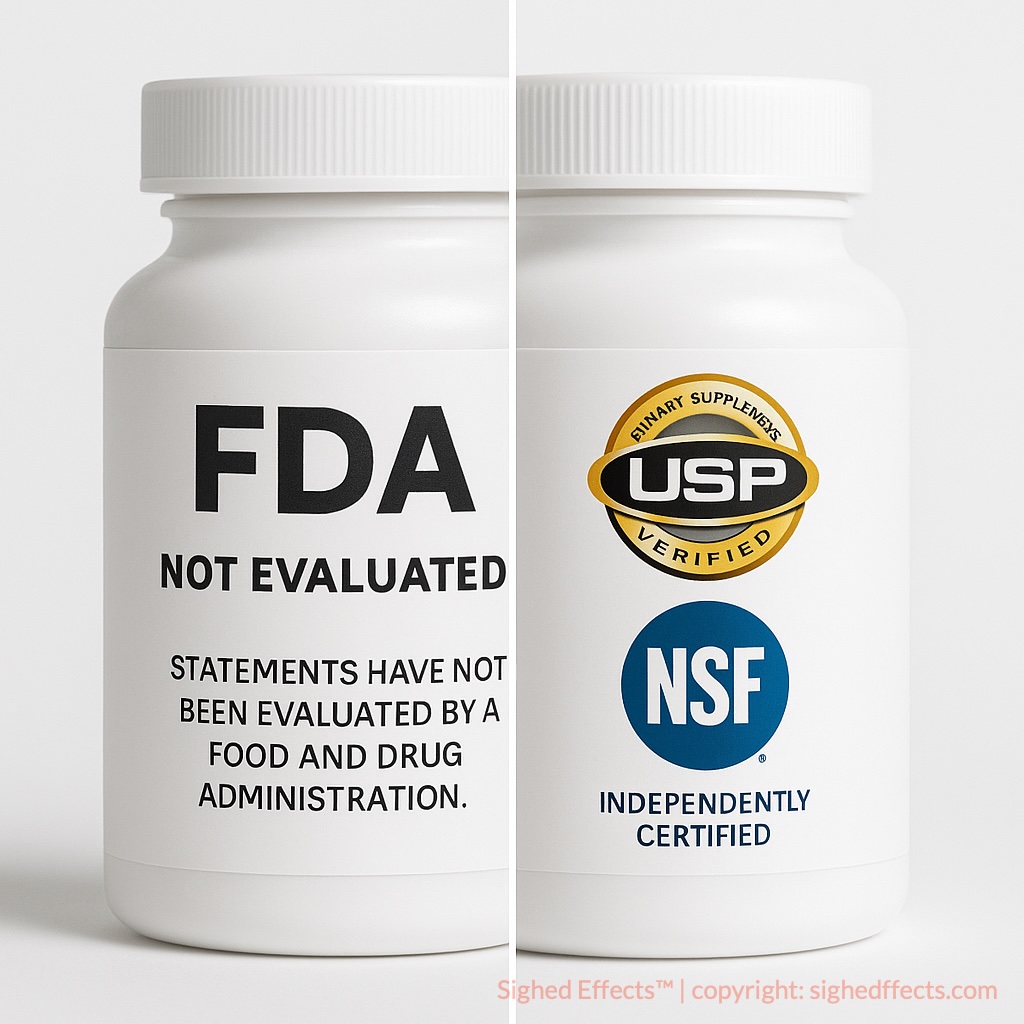
Major Supplement Certification Programs
The U.S. supplement market features several dominant third-party testing certifications, each with distinct methodologies, testing protocols, and credibility levels:
| Certification | Testing Focus | Independence Level | Best For |
|---|---|---|---|
| USP Verified | Ingredient purity, potency, manufacturing | High – Independent labs | General consumers, clinicians |
| NSF Certified for Sport | Banned substances, label accuracy | High – Independent testing | Athletes, professionals |
| Informed Choice | Monthly banned substance screening | High – Global recognition | International athletes |
| BSCG Certified Drug Free | Comprehensive contamination testing | High – Olympic-level standards | Elite athletes, military |
| Labdoor Certified | Retail product testing, transparency | Medium – Consumer-focused | Cost-conscious consumers |
Key Differences in Testing Approaches
Sample source varies significantly between programs:
- Retail sampling: Programs like Labdoor purchase products from stores
- Manufacturer submission: Most certifications test brand-provided samples
- Batch testing: Some programs test every production lot
Testing frequency affects contamination detection:
- One-time testing: Initial certification only
- Periodic retesting: Annual or quarterly verification
- Continuous monitoring: Monthly or batch-level testing
Independence level determines credibility:
- Fully independent: No financial ties to manufacturers
- Third-party contracted: Independent labs, manufacturer-funded
- Self-reported: Brand-provided test results
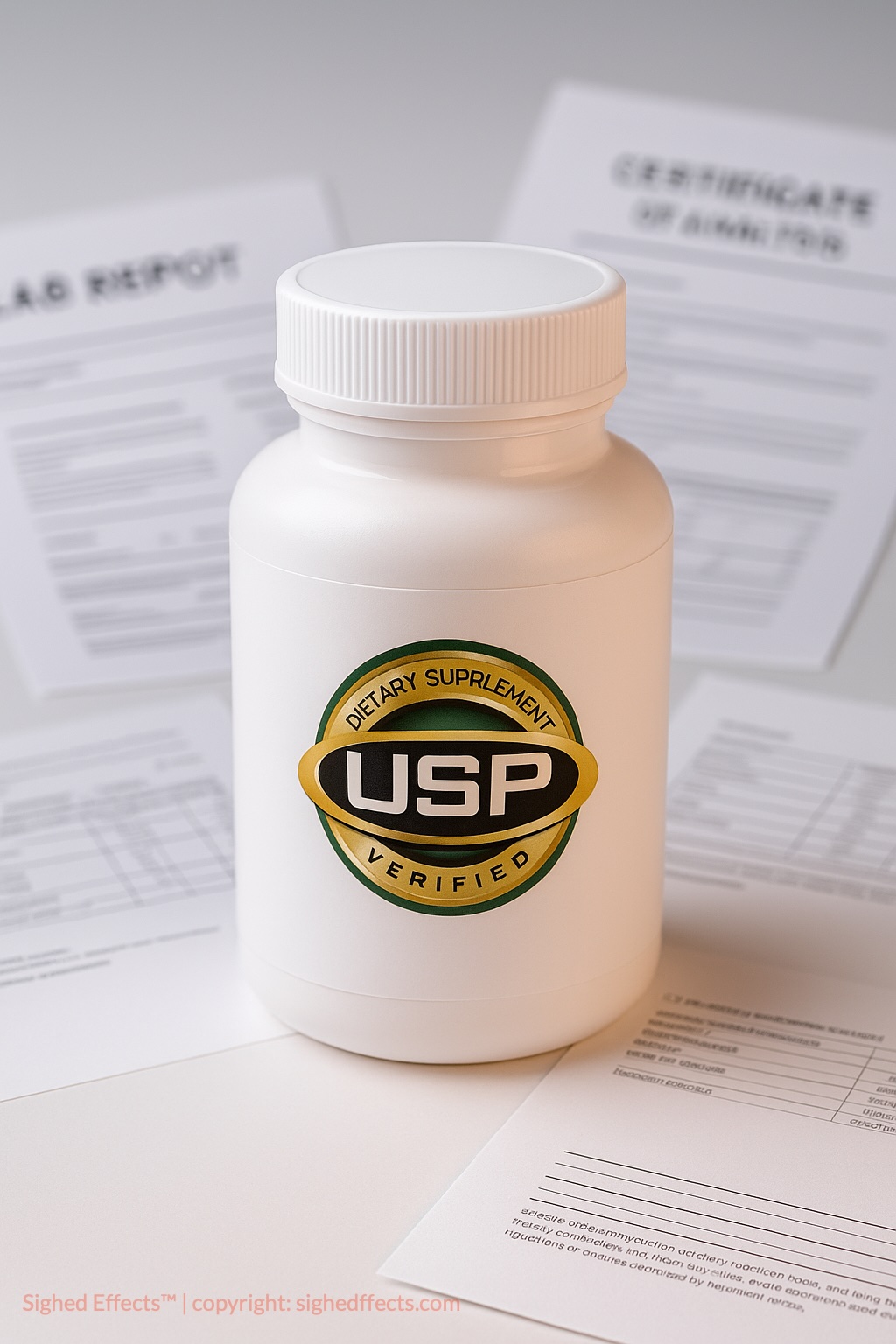
USP Verified: The Gold Standard for Supplement Certifications
USP Verified represents the most pharmaceutically-aligned certification available for dietary supplements. Administered by the United States Pharmacopeia—a nonprofit organization that sets drug quality standards recognized in federal law—this program applies pharmaceutical-grade testing to supplement products 6United States Pharmacopeia. “USP Verified Dietary Supplements Program.” USP Standards, 2024..
What USP Verified Actually Tests
The USP Verified certification requires comprehensive laboratory analysis across multiple quality parameters:
Ingredient Identity Verification
- Confirms active compounds match label claims
- Detects ingredient substitutions or adulterants
- Validates botanical species in herbal products
Potency and Purity Testing
- Measures active ingredient concentrations
- Verifies dosage accuracy within ±10% tolerance
- Tests for degradation products and impurities
Contaminant Screening
- Heavy metals (lead, mercury, cadmium, arsenic)
- Microbiological contaminants (bacteria, yeast, mold)
- Residual solvents from manufacturing
- Pesticide residues in botanical ingredients
Manufacturing Quality Audits
- Good Manufacturing Practice (GMP) compliance
- Supply chain documentation and traceability
- Quality control system verification
USP Verified vs “USP Grade” Claims
A critical distinction exists between USP Verified supplements and products claiming to be “USP grade” or “made to USP standards.” Only products displaying the official USP Verified mark have undergone actual testing and facility audits by USP laboratories 7U.S. Pharmacopeia. “Understanding USP Verification vs. USP Grade Claims.” Consumer Education, 2024..
Legitimate USP Verified products:
- Display the yellow and black USP Verified mark
- Appear in the searchable USP database
- Undergo ongoing monitoring and retesting
Misleading “USP grade” products:
- Use USP reference standards without verification
- Make unauthorized USP trademark claims
- Lack independent testing confirmation
Limitations of USP Verification
Despite its scientific rigor, USP Verified certification has notable limitations:
- Limited adoption: Less than 2% of supplements carry the USP mark due to cost and transparency requirements
- No efficacy testing: USP verifies quality but not clinical effectiveness
- Voluntary participation: Brands self-select for testing, potentially creating selection bias
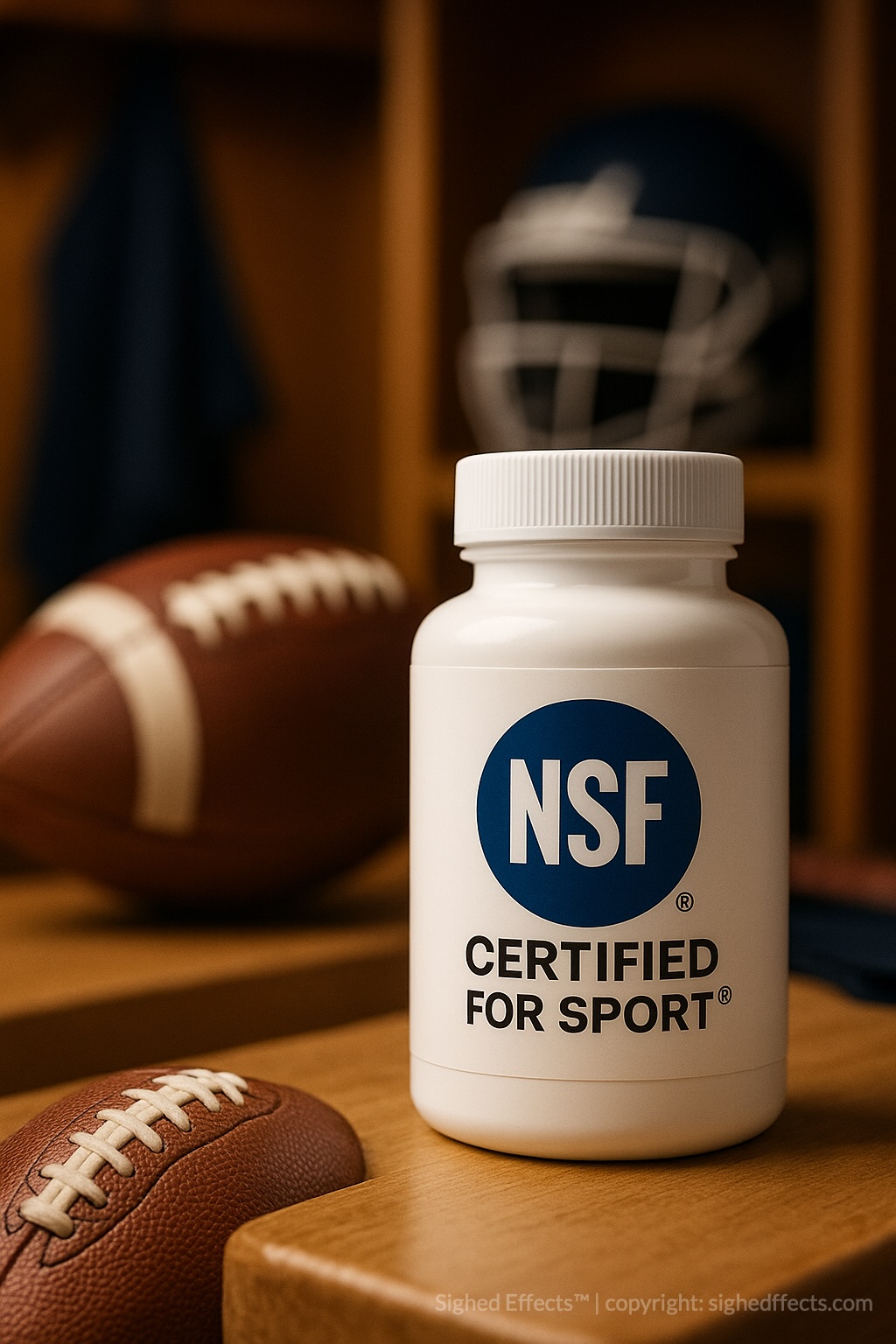
NSF Certified for Sport: Athlete Protection from Banned Substances
NSF Certified for Sport serves as the premier banned substance certification for supplements used in competitive athletics. Developed by NSF International—a global public health organization—this program screens products for over 280 prohibited performance-enhancing substances 8NSF International. “NSF Certified for Sport Program.” Athletic Testing Standards, 2024..
Who Relies on NSF Certified for Sport
Major sports organizations mandate or recommend NSF Certified supplements:
- Professional leagues: NFL, MLB, NHL, NBA, MLS
- Collegiate athletics: NCAA-approved supplement lists
- Olympic organizations: USOC and international committees
- Military branches: DoD procurement specifications
NSF Testing Requirements
To earn NSF Certified for Sport designation, products must meet stringent criteria:
Banned Substance Screening
- Tests for 280+ WADA prohibited substances
- Includes steroids, stimulants, hormone modulators
- Covers masking agents and diuretics
- Screens for emerging designer drugs
Label Accuracy Verification
- Confirms ingredient quantities match labels
- Validates supplement facts panel accuracy
- Tests for unlisted active compounds
Facility Audits and Documentation
- GMP compliance verification
- Supply chain traceability requirements
- Manufacturing process documentation
- Ongoing quality system monitoring
Continuous Monitoring Program
- Unannounced facility inspections
- Post-certification product testing
- Adverse event monitoring and reporting
NSF Database and Transparency
NSF Certified for Sport maintains a publicly searchable database containing:
- Certified product listings with batch numbers
- Manufacturing facility information
- Certification expiration dates
- Testing laboratory results summaries
This transparency level exceeds most other certification programs and provides verification for coaches, athletes, and compliance officers.
Regulatory Recognition
The FDA references NSF Certified for Sport in warning letters to supplement companies, demonstrating regulatory respect for the program’s standards 9FDA Warning Letter to Supplement Company. “Adulterated Dietary Supplements.” FDA Enforcement Actions, 2023.. This recognition enhances the certification’s credibility beyond sports applications.
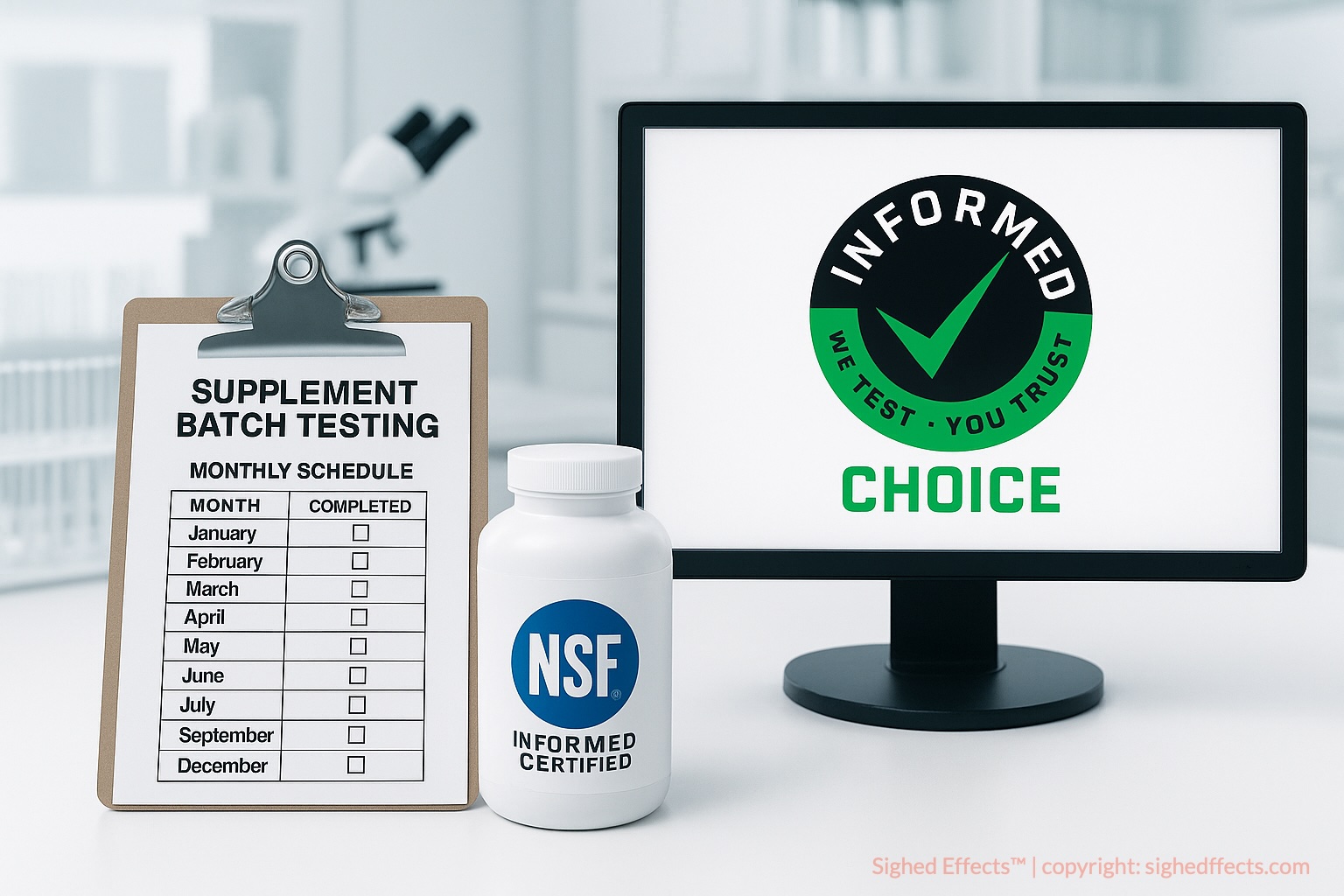
Informed Choice: Global Monthly Testing Standards
Informed Choice certification operates as a global banned substance testing program administered by LGC Group, a leading analytical testing company with expertise in anti-doping analysis. The program distinguishes itself through monthly batch testing protocols and international recognition 10LGC Group. “Informed Choice Global Certification Program.” Testing Standards Documentation, 2024..
Informed Choice Testing Protocol
Monthly Batch Testing
- Every production batch undergoes analysis
- Continuous monitoring vs. periodic testing
- Reduces contamination risk between audit cycles
- Provides real-time quality assurance
WADA Banned Substance Screening
- Comprehensive prohibited substance testing
- Follows World Anti-Doping Agency standards
- Updates testing panels for emerging compounds
- Includes recreational drugs affecting competition
Supply Chain Risk Assessment
- Raw material supplier evaluation
- Ingredient sourcing documentation
- Cross-contamination risk analysis
- Manufacturing facility qualification
Global Recognition and Adoption
Informed Choice certification enjoys widespread international acceptance:
- European markets: Preferred by EU supplement brands
- Asian markets: Recognized by Japanese and Australian regulators
- Elite sports: Used by Olympic committees worldwide
- Professional teams: Adopted across international leagues
Informed Choice vs NSF Certified for Sport
| Aspect | Informed Choice | NSF Certified for Sport |
|---|---|---|
| Testing frequency | Monthly batch testing | Periodic retesting |
| Geographic focus | Global/International | US-centric |
| Recognition | WADA, international sports | US leagues, NCAA |
| Label accuracy | Limited verification | Comprehensive testing |
Informed Choice excels in contamination prevention through frequent testing but provides less comprehensive label verification than NSF programs.
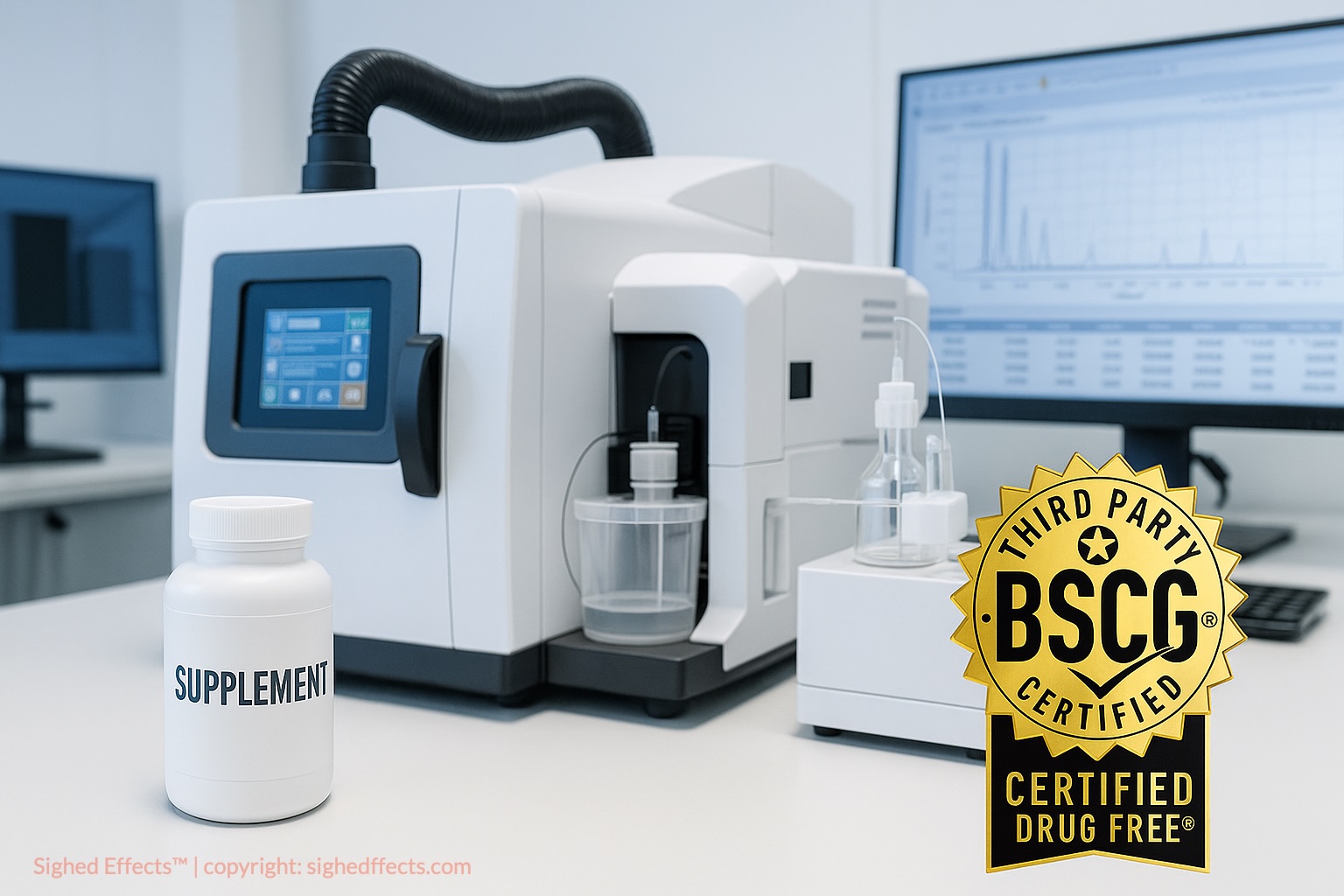
BSCG Certified Drug Free: Comprehensive Safety Testing
BSCG Certified Drug Free represents one of the most comprehensive supplement testing programs available. Operated by the Banned Substances Control Group—a family-owned laboratory founded by former Olympic drug testing scientists—this certification extends beyond sports-focused testing to include consumer safety screening 11Banned Substances Control Group. “BSCG Certified Drug Free Standards.” Laboratory Testing Protocols, 2024..
Expanded Testing Scope
BSCG certification provides broader contamination screening than sport-specific programs:
Drug and Banned Substance Testing
- 500+ prohibited substances including WADA list
- Prescription medications and controlled substances
- Over-the-counter drugs and metabolites
- Emerging synthetic compounds and analogs
Heavy Metal Contamination
- Lead, mercury, cadmium, arsenic analysis
- Exceeds FDA tolerance levels for safety
- Batch-specific contamination detection
- Source material traceability for metals
Microbiological Safety Testing
- Pathogenic bacteria (E. coli, Salmonella)
- Yeast and mold contamination
- Total aerobic plate counts
- Compliance with USP microbial limits
Label Accuracy Verification
- Active ingredient quantity confirmation
- Unlisted compound detection
- Potency variation analysis
- Supplement facts panel validation
BSCG’s Scientific Pedigree
The BSCG laboratory brings unique expertise to supplement testing:
- Founder background: Former Olympic laboratory directors
- Analytical capabilities: Advanced mass spectrometry equipment
- Method development: Custom testing protocols for emerging threats
- Regulatory experience: FDA and WADA consultation work
Target Markets for BSCG Certification
BSCG Certified Drug Free serves specialized market segments:
- Elite athletes: Olympic and professional competitors
- Military procurement: DoD and international defense contracts
- Healthcare institutions: Hospital and clinical supplement programs
- High-risk professions: Pilots, first responders, safety-sensitive workers
Cost and Accessibility Considerations
BSCG certification requires significant investment in testing and documentation:
- Higher certification costs than basic programs
- Extensive paperwork and audit requirements
- Limited consumer brand recognition vs. NSF
- Premium positioning in supplement market
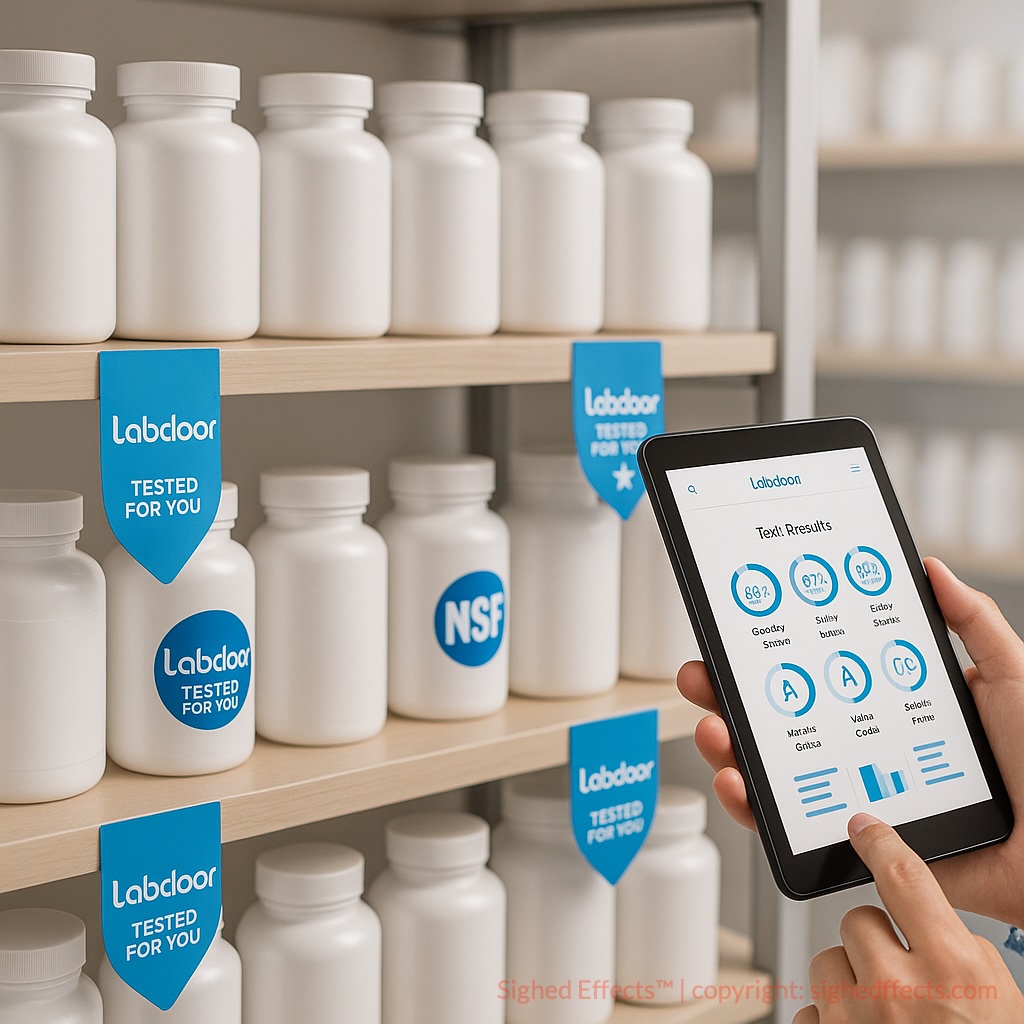
Labdoor Certification: Consumer-Focused Transparency
Labdoor certification takes a unique approach to supplement testing by focusing on consumer accessibility and retail-level product verification. Rather than working with manufacturers directly, Labdoor purchases products from retail stores and conducts independent laboratory analysis 12Labdoor LLC. “Independent Supplement Testing Methodology.” Consumer Testing Reports, 2024..
Labdoor’s Consumer-First Model
Retail Purchase Testing
- Products bought from actual stores and websites
- Tests what consumers actually receive
- Eliminates manufacturer sample bias
- Provides real-world quality assessment
Public Scoring System
- Letter grades (A+ to F) for easy comparison
- Composite scores across multiple criteria
- Side-by-side product comparisons
- Accessible to non-technical consumers
Transparent Reporting
- Full laboratory results publication
- Methodology disclosure and explanation
- Cost-effectiveness analysis included
- No hidden or proprietary scoring factors
What Labdoor Tests
Active Ingredient Accuracy
- Measures actual vs. labeled quantities
- Identifies under-dosed or over-dosed products
- Calculates ingredient variation percentages
- Assesses manufacturing consistency
Purity and Safety Screening
- Heavy metal contamination detection
- Banned substance screening for athletes
- Microbiological contaminant testing
- Pesticide residue analysis
Value Assessment
- Cost per milligram of active ingredients
- Quality-adjusted price comparisons
- Value rankings within product categories
- Budget-conscious consumer guidance
Strengths of Labdoor Certification
Consumer Accessibility
- Free access to most test results
- Simple scoring system vs. technical data
- Product recommendations by category
- Regular testing updates and revisions
Independence from Manufacturers
- No financial relationships with brands
- Unbiased product selection for testing
- Critical evaluation of marketing claims
- Consumer advocacy focus
Limitations of Labdoor Testing
Limited Manufacturing Oversight
- No facility audits or GMP verification
- Cannot assess production quality systems
- No supply chain documentation review
- Focus on end-product testing only
Voluntary Participation
- Brands can decline certification display
- No enforcement mechanism for poor scores
- Potential selection bias in certified products
- Limited coverage of total market
Methodological Concerns
- Some testing methods not peer-reviewed
- Limited transparency on laboratory selection
- Scoring algorithms may oversimplify quality
- Consumer education needs for interpretation
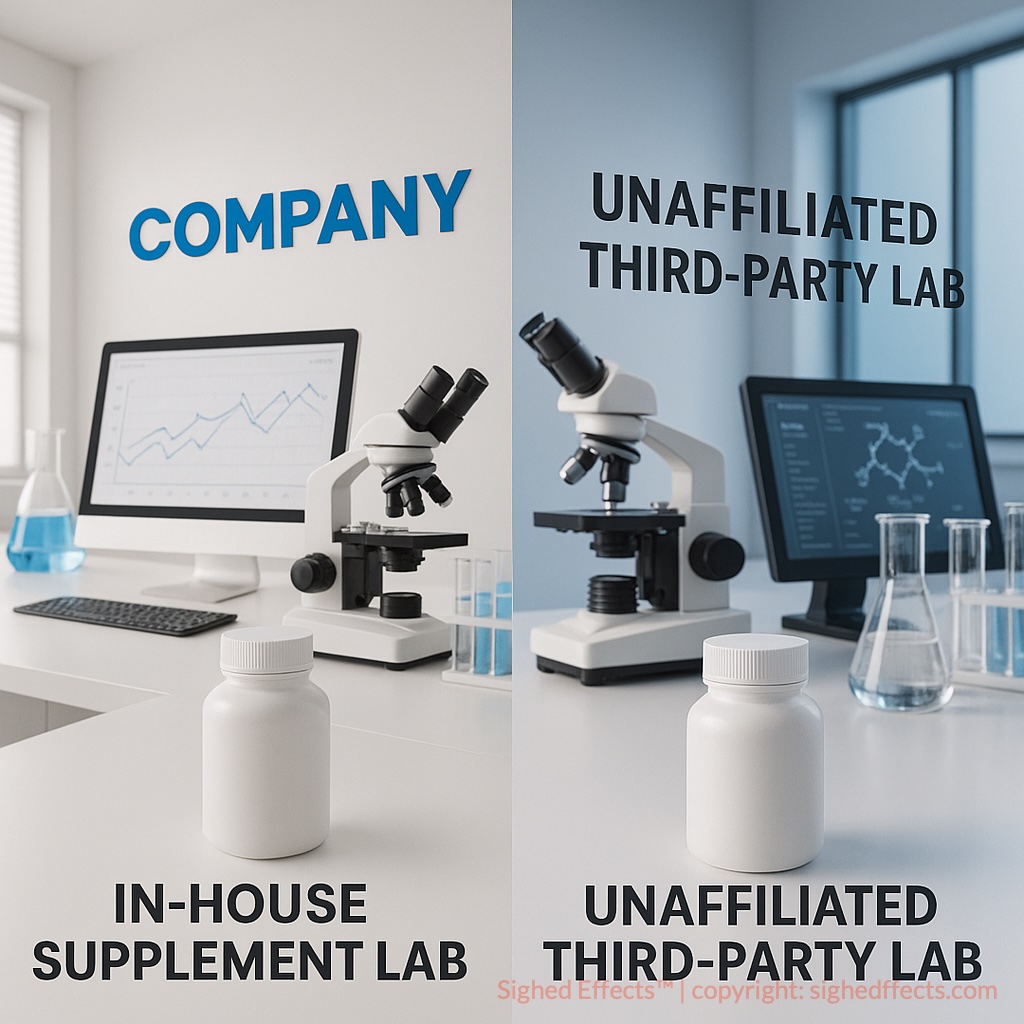
Independent vs In-House Testing: Understanding the Difference
The distinction between independent supplement testing and in-house testing represents one of the most critical factors in certification credibility. This difference affects the reliability, objectivity, and consumer protection value of any testing program 13Council for Responsible Nutrition. “Third-Party Testing Guidelines.” Industry Best Practices, 2023..
Defining Independent Testing
True independent testing requires complete separation between the testing laboratory and the supplement manufacturer:
Financial Independence
- No ownership relationships between lab and brand
- Testing fees paid but no ongoing financial ties
- No consulting or advisory relationships
- Arm’s length commercial transactions only
Operational Independence
- Lab selects testing methods and protocols
- Sample collection by independent parties
- Results reporting without manufacturer review
- Publication of findings regardless of outcomes
Sample Independence
- Retail purchase vs. manufacturer submission
- Random batch selection from inventory
- Chain of custody documentation
- No advance notice to manufacturers
Problems with In-House Testing Claims
Many supplements claim “third-party testing” while using testing arrangements that compromise independence:
Contract Lab Arrangements
- Manufacturer-selected laboratories
- Long-term exclusive testing contracts
- Results subject to manufacturer approval
- Financial incentives for favorable outcomes
Self-Submitted Samples
- Brands choose which batches to test
- “Best case” samples vs. random selection
- No verification of sample representativeness
- Cherry-picking of favorable results
Selective Results Reporting
- Publication only of passing test results
- Suppression of contamination findings
- Emphasis on less critical test parameters
- Marketing use vs. quality control purpose
Gray Areas in Testing Independence
Even reputable certification programs involve some manufacturer participation:
NSF and USP Programs
- Manufacturers pay certification fees
- Some sample submission by brands
- Voluntary participation and withdrawal
- Commercial relationship affects dynamics
Hybrid Models
- Independent labs with manufacturer contracts
- Retail sampling with brand cooperation
- Audit programs with industry funding
- Regulatory oversight with commercial elements
Why Independence Matters for Consumers
Credibility and Trust
- Independent testing reduces conflicts of interest
- Objective results vs. marketing-driven outcomes
- Consumer protection over brand protection
- Scientific integrity vs. commercial pressure
Contamination Detection
- Independent labs more likely to find problems
- No financial incentive to overlook issues
- Comprehensive testing vs. selective screening
- Public reporting of safety concerns
Quality Improvement
- Market pressure for genuine quality control
- Industry-wide standards improvement
- Consumer education about quality differences
- Regulatory support for enforcement actions
International Supplement Certifications
While U.S.-based certification programs dominate discussions of supplement quality, several international supplement regulation systems provide instructive comparisons and alternative approaches to product oversight 14World Health Organization. “Global Regulatory Frameworks for Herbal Medicines.” WHO Technical Report Series, 2023..
Canada’s Natural Product Number (NPN) System
Health Canada’s Natural Product Number represents a pre-market approval system that exceeds U.S. regulatory oversight:
Pre-Market Review Requirements
- Safety and efficacy evidence review
- Good Manufacturing Practice verification
- Ingredient quality and identity confirmation
- Labeling accuracy and health claim evaluation
NPN Certification Benefits
- Government regulatory approval vs. voluntary certification
- Mandatory quality standards compliance
- Consumer complaint and adverse event monitoring
- Product recall authority for safety issues
Comparison to U.S. Certifications
- Regulatory requirement vs. voluntary participation
- Government oversight vs. private organization standards
- Broader market coverage vs. selective brand participation
- Enforcement authority vs. certification withdrawal only
Australia’s Therapeutic Goods Administration (TGA)
TGA Listed and Registered supplements operate under a tiered regulatory system:
TGA Listed Products
- Self-certification by manufacturers
- Evidence standards for safety and quality
- Adverse event reporting requirements
- Post-market surveillance and compliance
TGA Registered Products
- Pre-market evaluation for higher-risk products
- Clinical evidence requirements for efficacy claims
- Manufacturing quality system audits
- Prescription-level regulatory oversight
Japan’s Foods for Specified Health Uses (FOSHU)
FOSHU certification requires clinical evidence for functional health claims:
Clinical Testing Requirements
- Human clinical trials for health benefit claims
- Safety evaluation in target populations
- Bioavailability and efficacy demonstration
- Long-term safety monitoring data
Quality Control Standards
- Standardized manufacturing processes
- Active compound standardization requirements
- Stability testing and shelf-life validation
- Contamination screening and limits
European Union Novel Foods Regulation
EU Novel Foods approval applies to new ingredients and innovative supplement formulations:
Safety Assessment Process
- Comprehensive toxicology evaluation
- Nutritional impact assessment
- Allergenicity and intolerance screening
- Environmental impact consideration
Authorization Requirements
- Scientific dossier submission and review
- Independent scientific committee evaluation
- Public consultation and comment periods
- Post-authorization monitoring obligations
Lessons for U.S. Consumers
Regulatory Oversight Benefits
- Mandatory quality standards vs. voluntary certification
- Government enforcement authority vs. industry self-regulation
- Broader market coverage vs. selective participation
- Consumer protection priority vs. commercial interests
Trade-offs and Limitations
- Higher costs passed to consumers
- Slower innovation and product development
- Regulatory bureaucracy and complexity
- Limited consumer choice in some markets
How to Choose the Right Supplement Certification
Selecting supplements with appropriate certifications requires matching your specific needs and risk tolerance with the strengths of different testing programs. No single certification addresses all quality concerns, making informed decision-making essential 15Institute of Medicine. “Dietary Supplements: A Framework for Evaluating Safety.” National Academies Press, 2023..
Certification Selection by User Type
General Consumers: Safety and Quality Focus
For everyday supplement users prioritizing safety and label accuracy:
Recommended Certifications:
- USP Verified: Gold standard for ingredient purity and potency
- Labdoor Certified: Transparent testing with consumer-friendly scoring
- Independent lab testing: Retail-purchased product verification
Key Selection Criteria:
- Ingredient identity and potency verification
- Heavy metal and contaminant screening
- Manufacturing quality (GMP) compliance
- Public access to testing results
Athletes and Competitive Sports
For users subject to drug testing or anti-doping regulations:
Recommended Certifications:
- NSF Certified for Sport: US sports league recognition
- Informed Choice: Global banned substance testing
- BSCG Certified Drug Free: Comprehensive contamination screening
Critical Requirements:
- WADA banned substance compliance
- Ongoing batch testing and monitoring
- Professional sports organization recognition
- Legal protection from inadvertent doping
Healthcare Professionals and Clinical Settings
For practitioners recommending supplements to patients:
Recommended Certifications:
- USP Verified: Pharmaceutical-grade testing standards
- BSCG Certified Drug Free: Comprehensive safety screening
- Independent lab testing: Unbiased quality verification
Professional Considerations:
- Scientific credibility and peer recognition
- Patient safety and liability protection
- Integration with clinical protocols
- Evidence-based quality assessment
Evaluating Certification Credibility
Testing Independence Assessment
- Is the laboratory financially independent from manufacturers?
- Are samples purchased retail or submitted by brands?
- Do testing protocols meet scientific standards?
- Are results published transparently?
Scope and Comprehensiveness
- What specific contaminants and adulterants are tested?
- Is label accuracy verified quantitatively?
- Are manufacturing facilities audited?
- How frequently is testing conducted?
Recognition and Acceptance
- Do regulatory agencies reference the certification?
- Is it recognized by professional organizations?
- Do major institutions accept the standards?
- Are enforcement actions taken for violations?
Red Flags in Supplement Certifications
Meaningless or Misleading Claims
- “Pharmaceutical grade” without USP Verified mark
- “Third-party tested” without specifying the laboratory
- “FDA approved” (illegal claim for supplements)
- Generic “quality assured” without testing details
Pay-to-Play Certification Mills
- Certification available without actual testing
- No public database of certified products
- Lack of testing methodology disclosure
- No ongoing monitoring or compliance requirements
Self-Certification Schemes
- Companies “certifying” their own products
- Industry trade groups providing “seals” to members
- Certification based solely on documentation review
- No independent laboratory analysis required
Cost vs. Benefit Analysis
Premium Pricing for Certified Products
- Certified supplements typically cost 15-30% more than non-certified alternatives
- Testing and compliance costs passed to consumers
- Limited price competition among certified brands
- Value assessment based on individual risk tolerance
Risk Reduction Benefits
- Lower probability of contamination or mislabeling
- Legal and professional protection for athletes
- Healthcare provider confidence for clinical use
- Peace of mind for safety-conscious consumers
Market Reality Considerations
- Most supplements lack meaningful certification
- High-quality products may exist without certification
- Certification doesn’t guarantee clinical effectiveness
- Marketing claims may exaggerate certification benefits
Frequently Asked Questions About Supplement Certifications
What is the best supplement certification?
USP Verified is widely considered the gold standard for supplement certifications, offering pharmaceutical-grade testing for ingredient identity, potency, purity, and manufacturing quality. For athletes, NSF Certified for Sport provides the most comprehensive banned substance protection with recognition from major professional leagues 16Consumer Reports. “Supplement Testing and Certification Guide.” Health Product Reviews, 2024..
Are supplement certifications worth the extra cost?
Certified supplements typically cost 15-30% more than non-certified alternatives, but provide measurable risk reduction for contamination, mislabeling, and quality issues. For athletes subject to drug testing, general consumers with safety concerns, and healthcare professionals, the additional cost often justifies the protection provided.
How can I verify if a supplement certification is legitimate?
Check the certifying organization’s website for a searchable database of certified products. Legitimate certifications like USP Verified, NSF Certified for Sport, and Informed Choice maintain public databases with product details, batch numbers, and expiration dates. Avoid products making generic “third-party tested” claims without specifying the testing laboratory.
Do supplement certifications test for effectiveness?
No, supplement certifications focus on safety, purity, and label accuracy rather than clinical effectiveness. Certifications verify that products contain what the label claims and are free from contaminants, but do not evaluate whether the supplement will produce intended health benefits.
What’s the difference between “USP Verified” and “USP grade”?
USP Verified indicates actual testing and certification by the U.S. Pharmacopeia, while “USP grade” or “made to USP standards” are marketing claims that may not involve any verification. Only products displaying the official USP Verified mark have undergone independent testing and facility audits.
How often do certified supplements get retested?
Testing frequency varies by certification program:
- Informed Choice: Monthly batch testing
- NSF Certified for Sport: Periodic retesting and unannounced audits
- USP Verified: Annual renewal with ongoing monitoring
- BSCG Certified Drug Free: Quarterly testing requirements
- Labdoor: Irregular retail sampling based on product popularity
Can supplement companies fake certification seals?
Yes, fraudulent use of certification marks occurs regularly in the supplement industry. Always verify certification claims by checking the official database of the certifying organization. Report suspected trademark violations to the certifying organization and FDA.
Do international supplements need U.S. certifications?
International supplements sold in the U.S. are not required to have American certifications, but many obtain them for market credibility. Some international regulatory systems (like Canada’s NPN or Australia’s TGA) provide equivalent or superior oversight compared to U.S. voluntary certifications.
What should I do if my certified supplement causes problems?
Report adverse events to both the certifying organization and FDA’s MedWatch system. Contact the manufacturer for immediate concerns. Certified products typically have better customer service and recall procedures than non-certified alternatives.
Are generic or store brand supplements ever certified?
Major retailers like Costco, CVS, and Walgreens increasingly offer certified store-brand supplements to compete with name brands. Generic supplements can achieve the same certifications as premium brands if they meet testing requirements, often providing better value for certified quality.
Conclusion: Making Informed Decisions About Supplement Certifications
Supplement certifications serve as essential quality indicators in an industry with minimal regulatory oversight. While no certification guarantees clinical effectiveness, legitimate third-party testing programs provide measurable protection against contamination, mislabeling, and quality issues that affect supplement safety and efficacy.
USP Verified remains the gold standard for general consumers, offering pharmaceutical-grade testing with strong regulatory recognition. NSF Certified for Sport and Informed Choice provide essential protection for athletes, while BSCG Certified Drug Free offers the most comprehensive contamination screening available.
The key to using certifications effectively lies in understanding what each program actually tests, how independent the testing is, and whether the certification matches your specific needs and risk tolerance. As the supplement industry continues evolving, informed consumers who can decode certification claims will have significant advantages in product selection and safety outcomes.
For ongoing updates on supplement certifications and testing standards, explore our complete Certifications hub featuring detailed analyses of each program and emerging industry developments.
About This Article: This comprehensive guide is part of Sighed Effects’ evidence-based approach to supplement evaluation. All information is current as of 2025 and includes citations to peer-reviewed research and regulatory documentation. For personalized supplement recommendations based on your specific goals, explore our Smart Stacks tool.
References
- 1U.S. Food and Drug Administration. “FDA 101: Dietary Supplements.” FDA Consumer Updates, 2022.
- 2Dietary Supplement Health and Education Act of 1994, Public Law 103-417, 103rd Congress.
- 3Cohen, P.A. “Hazardous dietary supplements.” New England Journal of Medicine, 2022; 386(15): 1447-1452.
- 4Clean Label Project. “Protein Powder Study.” 2023 Product Testing Report.
- 5Newmaster, S.G. et al. “DNA barcoding detects contamination and substitution in North American herbal products.” BMC Medicine, 2023; 11: 222.
- 6United States Pharmacopeia. “USP Verified Dietary Supplements Program.” USP Standards, 2024.
- 7U.S. Pharmacopeia. “Understanding USP Verification vs. USP Grade Claims.” Consumer Education, 2024.
- 8NSF International. “NSF Certified for Sport Program.” Athletic Testing Standards, 2024.
- 9FDA Warning Letter to Supplement Company. “Adulterated Dietary Supplements.” FDA Enforcement Actions, 2023.
- 10LGC Group. “Informed Choice Global Certification Program.” Testing Standards Documentation, 2024.
- 11Banned Substances Control Group. “BSCG Certified Drug Free Standards.” Laboratory Testing Protocols, 2024.
- 12Labdoor LLC. “Independent Supplement Testing Methodology.” Consumer Testing Reports, 2024.
- 13Council for Responsible Nutrition. “Third-Party Testing Guidelines.” Industry Best Practices, 2023.
- 14World Health Organization. “Global Regulatory Frameworks for Herbal Medicines.” WHO Technical Report Series, 2023.
- 15Institute of Medicine. “Dietary Supplements: A Framework for Evaluating Safety.” National Academies Press, 2023.
- 16Consumer Reports. “Supplement Testing and Certification Guide.” Health Product Reviews, 2024.
This article is part of our Certifications hub — Our deep dives into third-party testing, purity standards, and label verification systems across the supplement industry..
Questions or Comments?
If you have a question or comment about this article, feel free to leave it below. All comments are moderated for clarity, accuracy, and relevance.
